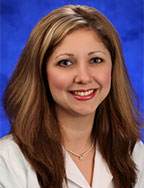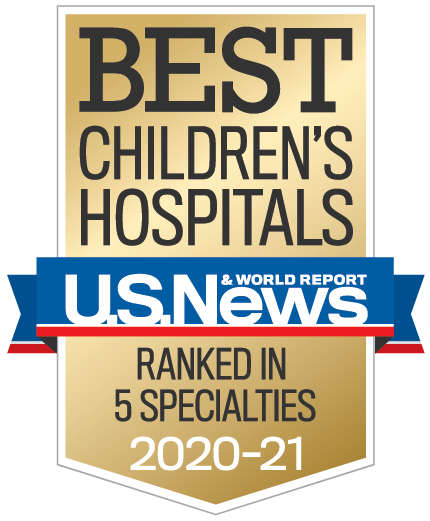Multidisciplinary Perinatal Program Cares for Mothers and Babies
Approximately one in 33 babies in the U.S. is born with a birth defect. Among the most common are atrioventricular septal defects, spina bifida and intestinal atresia or stenosis.1 Many major defects are detected early during routine ultrasound imaging. “For women with a complex, high-risk pregnancy, a multidisciplinary team is usually needed to manage the needs of the mother and baby, throughout pregnancy, delivery and postpartum care,” explains Jaimey M. Pauli, M.D., a maternal-fetal medicine specialist at Penn State Health Milton S. Hershey Medical Center. Dr. Pauli and Thomas Chin, M.D., chief, pediatric cardiology, co-direct the Penn State Perinatal Program, an active outreach program for patients who are pregnant or have newborns with birth defects or abnormalities.
“Expectant parents are often overwhelmed when they learn about these serious fetal abnormalities. Aside from coping with the obvious emotional impact, they need help obtaining the complex care their baby requires to achieve the best possible outcomes. With our program, a team of specialists handles everything and provides highly coordinated care at a single center, which reduces stress and supports the parents,” adds Dr. Pauli.
The perinatal program coordinator, Laurie Reesman, R.N., B.S.N., helps the family navigate the process by arranging appointments with the maternal-fetal and pediatric specialists to provide necessary diagnostic evaluations, parent consultations, prenatal care, delivery and postnatal care. The team of specialists, which includes maternal-fetal medicine specialists, pediatric cardiologists, neonatologists, cardiothoracic surgeons, neurosurgeons, surgeons, nephrologists, urologists, orthopaedic surgeons, radiologists and social workers, meet on a monthly basis to discuss each case and ensure timing is coordinated. Dr. Pauli also meets weekly with the coordinators to review each patient’s plan-of-care.
Read a summary of one case, from referral to discharge, through the coordination of the Penn State Perinatal Program.
Postpartum, mothers receive care with the maternal-fetal medicine service while the newborn’s care is initiated with the Children’s Hospital comprehensive pediatric medical and surgical teams. Most babies born early or with these anticipated challenges require surgery, such as complex congenital heart disease repair, closure of open neural tube defects and repair of abdominal wall defects, such as gastroschisis and omphalocele. From this point, they are cared for in the neonatal intensive care unit (NICU) or the pediatric intensive care unit (PICU).
Non-medical care and support is also provided; mothers who need to stay close for delivery and family members of hospitalized children may be able to stay free-of-charge at the Ronald McDonald House near the Milton S. Hershey Medical Center campus. Additionally, the Isabel Cate Rineer Memorial Endowment in Perinatology is available to support families’ physical and emotional needs. A social worker helps coordinate ongoing medical care in the families’ local communities with follow-up support at Penn State Children’s Hospital. For infants with a life-threatening condition, emotional care and planning to meet the family’s goals is provided through the Penn State Children’s Hospital Hummingbird Program.
“We offer a family-centered environment with the highest level of care available to both the pregnant mother and her infant,” comments Dr. Pauli. “Our families are reassured that Penn State Health has the expertise to manage their high-risk pregnancy, as well as their infant’s medical and surgical needs.”
Overview of Hypoplastic Left Heart Syndrome Case Handled by the Penn State Health Milton S. Hershey Perinatal Program
- Detection and referral: A 32-year-old woman is referred to the perinatal program following anatomic ultrasound at 19 weeks gestation revealing complex cardiac defects in the fetus.
- Initial evaluation: Follow-up fetal echocardiogram and additional evaluation reveal hypoplastic left heart syndrome; mother is in good health; history of one prior healthy, full-term, vaginal birth three years ago.
- Care coordination: Perinatal program coordinator arranges parent consultations and evaluations at Penn State Health Milton S. Hershey Medical Center on a one- or two-day schedule with the following specialists:
- Neonatologist
- Pediatric cardiothoracic surgeon
- Maternal-fetal medicine specialist
- Social services
- Genetics consult
- Routine visits: Prenatal care visits with maternal-fetal medicine; serial fetal ultrasound evaluation, and fetal monitoring
- Delivery: Successful full-term vaginal delivery at 37 weeks; infant is successfully stabilized in the NICU.
- Perinatal evaluation: Infant undergoes echocardiography and is evaluated by cardiac surgery team.
- Perinatal intervention: Infant undergoes the Norwood procedure as the first step in surgical cardiac repair two days after birth; parents stay at Ronald McDonald House; infant is in PICU for 36 days.
- Discharge and ongoing support: Infant is discharged to home, with continuing supportive care from local providers and followed by Penn State Health cardiothoracic surgeons. The infant will undergo a series of staged cardiac surgeries in the first several years of life.
 Jaimey Maureen Pauli, M.D.
Jaimey Maureen Pauli, M.D.
Co-director, Perinatal Program, Penn State Children’s Hospital
Maternal-Fetal Medicine Specialist
Penn State Health Milton S. Hershey Medical Center
PHONE: 717-531-7373
E-MAIL: jpauli@hmc.psu.edu
CLINICAL INTERESTS: “My clinical interests include high-risk maternal and fetal conditions, ultrasound diagnosis of fetal anomalies, and genetic screening and diagnostic testing.”
Reference:
- United States Centers for Disease Control: http://www.cdc.gov/ncbddd/birthdefects/data.html; Accessed 8/5/2015.

